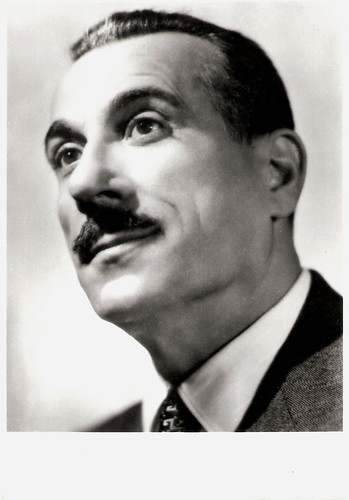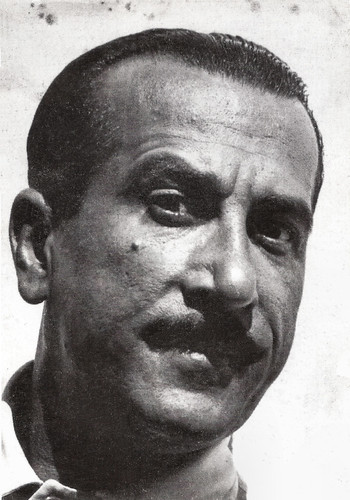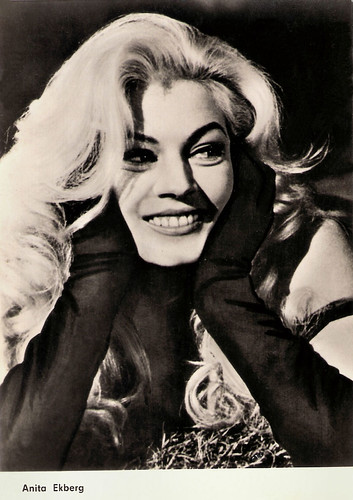Italian comic actor Peppino De Filippo (1903-1980) was a star of theatre, television and cinema in his country. He started his career on stage with his brother Eduardo and their sister Titina. In the 1950s and 1960s he became the partner of Totó in very popular comedy films and he appeared in two classics by Federico Fellini.

Italian postcard in the Hobby series by Bromostampa, Milano.

Italian postcard. Photo of Titina, Eduardo and Peppino De Filippo.
Peppino De Filippo was born Giuseppe De Filippo in Naples, Italy in 1893. He came from a typical stage family. His father was the playwright Eduardo Scarpetta and his mother Luisa De Filippo. His brother was actor and dramatist Eduardo De Filippo and his sister actress Titina De Filippo. His half-brothers were the actors Vincenzo Scarpetta, Eduardo Passarelli and Pasquale De Filippo.
Peppino debuted on stage at six in Scarpetta's play Miseria e Nobilta. He studied the piano and went away to college for two years. During WWI, back in Naples, he joined Scarpetta's company Molinari, and it was here that he met Totò. At 22, he joined the company of Salvatore De Muto but had to return to the Scarpetta company after his estranged father, Eduardo Scarpetta, passed away.
Thus he, his brother Eduardo and their sister Titina started to work together. After several attempts with different acting companies, they founded the Compagnia Teatro Umoristico: i De Filippo in 1931. The three staged their own brand of comedy and worked alongside the likes of Tina Pica, Carlo Pisacane, Agostino Salvietti and Giovanni Berardi. It was a successful experience, featuring tours all over Italy, new comedies, enthusiastic ratings by critics, and sold-out theatres.
Peppino De Filippo played in several Italian films. He made his screen debut in the French-Italian comedy Tre uomini in frack/Three Lucky Fools (Mario Bonnard, 1933) starring Tito Schipa and his brother Eduardo De Filippo. It was followed by Quei due/Those Two (Gennaro Righelli, 1935) with Eduardo and Assia Noris.
In campagna è caduta una stella/In the Country Fell a Star (Eduardo De Filippo, 1939) was based on a play written by Peppino De Filippo. Peppino and Eduardo play two peasant brothers who become obsessed with an American film starlet (Rosina Lawrence) who visits their small town and they neglect their fiancées. However, in 1944, due to a controversy with his brother, Peppino abandoned their theatre company and their successful cooperation ended definitively.

Italian postcard. Photo: publicity still of Casanova farebbe così/Casanova Would Do It That Way! (Carlo Ludovico Bragaglia, 1942) with Peppino and Eduardo de Filippo and Clelia Matania.

Italian postcard in the series Gli Artisti di Napoli.
In 1945, Peppino De Filippo also separated from Adele Carloni, his wife of 16 years. He debuted with his new company with 'I Casi Sono Due' at the Teatro Olimpia in Milan. The separation of his brother and sister would allow him to find his own stylistic footprint as an author, being easily distinguishable from Eduardo's: Peppino's comedies are usually easier and more elegant. In 1950, he starred in the film comedy Luci del varietà/Variety Lights, produced and directed by Federico Fellini and Alberto Lattuada and co-starring Carla Del Poggio and Giulietta Masina. This bittersweet drama is about a beautiful but ambitious young woman who joins a group of second-rate theatrical performers on tour and inadvertently causes jealousy and emotional crises.
In Italy he is probably best remembered for his comedies with Totò, starting with Totò, Peppino e la malafemmina/Toto, Peppino, and the Hussy (Camillo Mastrocinque, 1956), Totò, Peppino e i fuorilegge/Totò, Peppino and the outlaws (Camillo Mastrocinque, 1956), and La banda degli onesti/The Band of Honest Men (Camillo Mastrocinque, 1956). These films obtained outstanding success, and for Totò, Peppino e i fuorilegge, De Filippo was awarded a Silver Ribbon for Best Supporting Actor.
His other comedies include Signori, in carrozza!/Rome-Paris-Rome (Luigi Zampa, 1951) with Aldo Fabrizi, Un giorno in pretura/A Day in Court (Steno, 1954), La nonna Sabella/Oh! Sabella (Dino Risi, 1957) and Ferdinando I° re di Napoli/Ferdinand I, King of Naples (Gianni Franciolini, 1959). From 1959 to 1969 he managed the Teatro delle Arti in Rome and had worldwide success internationally. Peppino repeatedly showed his extraordinary versatility; particularly noteworthy are his performance in Il Guardiano (The Caretaker) by Harold Pinter and as Harpagon in The Miser by Molière, where he proved to be a skilful actor whose ability had grown beyond Neapolitan comedies.
In the cinema, he worked again with Federico Fellini, at Le tentazioni del dottor Antonio/The Temptation of Dr Antonio, a hilarious segment for the anthology film Boccaccio '70 (1962). De Filippo plays a drooling middle-aged professor fed up with too much immorality. His anger knows no bounds when a provocative billboard of Anita Ekberg advertising ‘Drink more milk’ is put up opposite his residence. The image begins to haunt him and in his hallucinations, he is pursued and captured by a giant form of the buxom Swedish star in a deserted Rome. At one point, his umbrella disappears between her breasts. For a TV show, De Filippo invented the character Pappagone. He represented a humble servant of Commendatore Peppino De Filippo (the title of Commendatore is a public honour of the Italian Republic). He performed as a sort of usher, a typical character of the Neapolitan theatre, and coined many funny phrases and jargon, that would transform into popular sayings.
Peppino De Filippo died in Rome in 1980 due to a tumour. He was 76. He married three times, and his first wife Adele Carloni gave him his son Luigi De Filippo, who successfully carried on his father's work. He married his second wife, actress Lidia Martora, only a few hours before her death. In fact, they have been partners for more than 25 years, but he was still married to his first wife (and divorce was not allowed in Italy). In December 1970 divorce was sanctioned by law. De Filippo asked immediately for divorce, but Lidia Martora was already seriously ill, so their wedding was allowed - a tragic trick of chance - only on the same day on which she died. In 1977 he married Clelia Mangano, his business partner.

Italian postcard. Reproduction of the film poster for the comedy Signori si nasce/Gentlemen Are Born (Mario Mattoli, 1960) with Totò, Peppino De Filippo, and Delia Scala.

Anita Ekberg. East-German postcard by VEB Progress FilmVertrieb, Berlin, no. 2391, 1965. Photo: publicity still for Boccaccio '70 (Federico Fellini, 1962).

Italian postcard in the eries Gli Artisti di Napoli, ed. unknown.
Italian actress, playwright and screenwriter Annunziata "Titina" De Filippo (1898-1963) was considered one of the greatest theatre actresses of the twentieth century. Thanks to her artistic partnership with her brothers Eduardo and Peppino, she is also remembered for her long career in cinema, which allowed her to work alongside greats of Italian show business such as Totò, Vittorio De Sica, Vittorio Gassman, Tina Pica, Alberto Sordi and Nino Manfredi.
Sources: Rosaria DiNatale (IMDb), Wikipedia (English and Italian), and IMDb.
This post was last updated on 17 March 2024.

Italian postcard in the Hobby series by Bromostampa, Milano.

Italian postcard. Photo of Titina, Eduardo and Peppino De Filippo.
Own brand of comedy
Peppino De Filippo was born Giuseppe De Filippo in Naples, Italy in 1893. He came from a typical stage family. His father was the playwright Eduardo Scarpetta and his mother Luisa De Filippo. His brother was actor and dramatist Eduardo De Filippo and his sister actress Titina De Filippo. His half-brothers were the actors Vincenzo Scarpetta, Eduardo Passarelli and Pasquale De Filippo.
Peppino debuted on stage at six in Scarpetta's play Miseria e Nobilta. He studied the piano and went away to college for two years. During WWI, back in Naples, he joined Scarpetta's company Molinari, and it was here that he met Totò. At 22, he joined the company of Salvatore De Muto but had to return to the Scarpetta company after his estranged father, Eduardo Scarpetta, passed away.
Thus he, his brother Eduardo and their sister Titina started to work together. After several attempts with different acting companies, they founded the Compagnia Teatro Umoristico: i De Filippo in 1931. The three staged their own brand of comedy and worked alongside the likes of Tina Pica, Carlo Pisacane, Agostino Salvietti and Giovanni Berardi. It was a successful experience, featuring tours all over Italy, new comedies, enthusiastic ratings by critics, and sold-out theatres.
Peppino De Filippo played in several Italian films. He made his screen debut in the French-Italian comedy Tre uomini in frack/Three Lucky Fools (Mario Bonnard, 1933) starring Tito Schipa and his brother Eduardo De Filippo. It was followed by Quei due/Those Two (Gennaro Righelli, 1935) with Eduardo and Assia Noris.
In campagna è caduta una stella/In the Country Fell a Star (Eduardo De Filippo, 1939) was based on a play written by Peppino De Filippo. Peppino and Eduardo play two peasant brothers who become obsessed with an American film starlet (Rosina Lawrence) who visits their small town and they neglect their fiancées. However, in 1944, due to a controversy with his brother, Peppino abandoned their theatre company and their successful cooperation ended definitively.

Italian postcard. Photo: publicity still of Casanova farebbe così/Casanova Would Do It That Way! (Carlo Ludovico Bragaglia, 1942) with Peppino and Eduardo de Filippo and Clelia Matania.

Italian postcard in the series Gli Artisti di Napoli.
Drink more milk
In 1945, Peppino De Filippo also separated from Adele Carloni, his wife of 16 years. He debuted with his new company with 'I Casi Sono Due' at the Teatro Olimpia in Milan. The separation of his brother and sister would allow him to find his own stylistic footprint as an author, being easily distinguishable from Eduardo's: Peppino's comedies are usually easier and more elegant. In 1950, he starred in the film comedy Luci del varietà/Variety Lights, produced and directed by Federico Fellini and Alberto Lattuada and co-starring Carla Del Poggio and Giulietta Masina. This bittersweet drama is about a beautiful but ambitious young woman who joins a group of second-rate theatrical performers on tour and inadvertently causes jealousy and emotional crises.
In Italy he is probably best remembered for his comedies with Totò, starting with Totò, Peppino e la malafemmina/Toto, Peppino, and the Hussy (Camillo Mastrocinque, 1956), Totò, Peppino e i fuorilegge/Totò, Peppino and the outlaws (Camillo Mastrocinque, 1956), and La banda degli onesti/The Band of Honest Men (Camillo Mastrocinque, 1956). These films obtained outstanding success, and for Totò, Peppino e i fuorilegge, De Filippo was awarded a Silver Ribbon for Best Supporting Actor.
His other comedies include Signori, in carrozza!/Rome-Paris-Rome (Luigi Zampa, 1951) with Aldo Fabrizi, Un giorno in pretura/A Day in Court (Steno, 1954), La nonna Sabella/Oh! Sabella (Dino Risi, 1957) and Ferdinando I° re di Napoli/Ferdinand I, King of Naples (Gianni Franciolini, 1959). From 1959 to 1969 he managed the Teatro delle Arti in Rome and had worldwide success internationally. Peppino repeatedly showed his extraordinary versatility; particularly noteworthy are his performance in Il Guardiano (The Caretaker) by Harold Pinter and as Harpagon in The Miser by Molière, where he proved to be a skilful actor whose ability had grown beyond Neapolitan comedies.
In the cinema, he worked again with Federico Fellini, at Le tentazioni del dottor Antonio/The Temptation of Dr Antonio, a hilarious segment for the anthology film Boccaccio '70 (1962). De Filippo plays a drooling middle-aged professor fed up with too much immorality. His anger knows no bounds when a provocative billboard of Anita Ekberg advertising ‘Drink more milk’ is put up opposite his residence. The image begins to haunt him and in his hallucinations, he is pursued and captured by a giant form of the buxom Swedish star in a deserted Rome. At one point, his umbrella disappears between her breasts. For a TV show, De Filippo invented the character Pappagone. He represented a humble servant of Commendatore Peppino De Filippo (the title of Commendatore is a public honour of the Italian Republic). He performed as a sort of usher, a typical character of the Neapolitan theatre, and coined many funny phrases and jargon, that would transform into popular sayings.
Peppino De Filippo died in Rome in 1980 due to a tumour. He was 76. He married three times, and his first wife Adele Carloni gave him his son Luigi De Filippo, who successfully carried on his father's work. He married his second wife, actress Lidia Martora, only a few hours before her death. In fact, they have been partners for more than 25 years, but he was still married to his first wife (and divorce was not allowed in Italy). In December 1970 divorce was sanctioned by law. De Filippo asked immediately for divorce, but Lidia Martora was already seriously ill, so their wedding was allowed - a tragic trick of chance - only on the same day on which she died. In 1977 he married Clelia Mangano, his business partner.

Italian postcard. Reproduction of the film poster for the comedy Signori si nasce/Gentlemen Are Born (Mario Mattoli, 1960) with Totò, Peppino De Filippo, and Delia Scala.

Anita Ekberg. East-German postcard by VEB Progress FilmVertrieb, Berlin, no. 2391, 1965. Photo: publicity still for Boccaccio '70 (Federico Fellini, 1962).

Italian postcard in the eries Gli Artisti di Napoli, ed. unknown.
Italian actress, playwright and screenwriter Annunziata "Titina" De Filippo (1898-1963) was considered one of the greatest theatre actresses of the twentieth century. Thanks to her artistic partnership with her brothers Eduardo and Peppino, she is also remembered for her long career in cinema, which allowed her to work alongside greats of Italian show business such as Totò, Vittorio De Sica, Vittorio Gassman, Tina Pica, Alberto Sordi and Nino Manfredi.
Sources: Rosaria DiNatale (IMDb), Wikipedia (English and Italian), and IMDb.
This post was last updated on 17 March 2024.
No comments:
Post a Comment